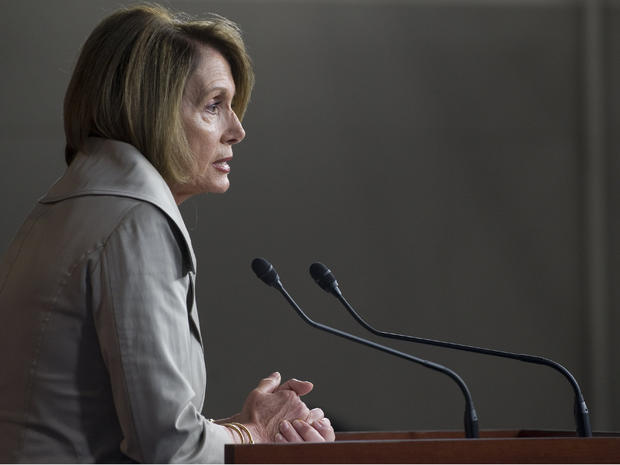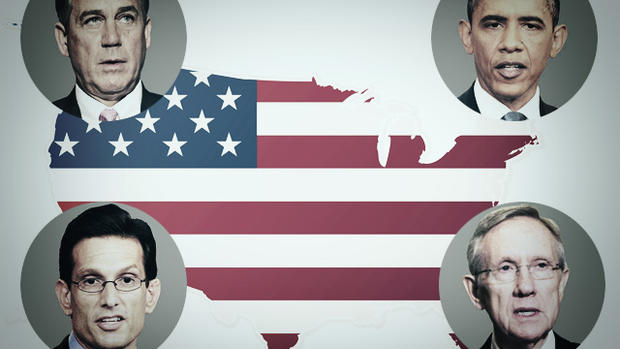Is the debt limit vote like the TARP vote?
The United States is just days away from heading into unchartered economic waters. With just five days left to raise the debt limit before Washington exhausts its authority to borrow money, politicians are making their case by alluding to another moment of economic panic in Washington -- the days before the passage of the Troubled Asset Relief Program (TARP), otherwise known as the "bank bailout."
Asked about the comparison between TARP and the vote to raise the debt ceiling, House Democratic leader Nancy Pelosi today said that in both cases, Republicans were willing to risk economic calamity.
TARP was "the worst bill, our members will tell you, they ever had to vote for, but they did because it was essential to our financial stability," Pelosi said. For "the first vote, the Republicans practically didn't show up, and the market went down. We increased the number of Democratic votes, they got more Republican votes, but it was Democratic votes that passed that bill."
Pelosi questioned whether now, like in 2008, Republicans are waiting for "the markets to come tumbling down" before supporting the legislation.
"Hopefully that is not the case," she said.
Like TARP, the debt limit is something that is widely misunderstood by the public, but also is generally opposed. Congress eventually passed the bank bailout plan in 2008 after the Dow Jones lost 777 points in one day after its initial defeat. Now, the White House and others are warning that if Congress doesn't extend the government's borrowing authority, the U.S. could risk defaulting on its loans, Treasury securities could be downgraded and the global economy could suffer.
Analysis: Debt ceiling deja vu?
Pelosi said today that in 2008, Democrats were willing to cooperate with President Bush, and Republicans should now cooperate with President Obama.
Some conservatives, meanwhile, are alluding to TARP as an example of why Republicans shouldn't support the debt limit increase.
Sarah Palin on Fox News Wednesday night said both scenarios amounted to "scaring the American people," even though she supported the bank bailout in 2008.
Sharron Angle, a 2010 Republican Senate candidate, slammed Sen. John McCain as "Lord of the TARP" on Thursday , in the context of the debt limit discussion. Her insult was in response to remarks McCain made on the Senate floor yesterday, criticizing conservatives who plan to vote against House Speaker John Boehner's plan to raise the debt limit. Quoting a Wall Street Journal article yesterday, McCain called those conservatives "Tea Party hobbits" following in the mold of failed Republican candidates like Angle.
GOP divided with Boehner debt plan vote on tap
CBSNews.com special report: America's debt battle
While Angle lost her Senate bid, her dig at McCain is a clear reminder that voting for TARP was an unwise political move for Republicans.
As Nate Silver of the New York Times reports, "There is evidence that voting for the bailout program may have been directly responsible for costing some members of Congress their seats. Although voting for a debt limit increase is not likely to be nearly so unpopular as bailing out the banks -- in fact, it's not clear where public opinion stands about it at this point -- that's something that many members of Congress, especially in swing districts, will have in the back of their minds."
Rep. Darrell Issa, R-Calif., pointed out as much in explaining his support for Boehner's plan, which would increase the U.S. borrowing limit by up to $900 billion while cutting more than $900 billion in spending over the next decade. Though Issa supports Boehner's plan, he was against TARP.
The comparisons, Issa said in a statement, "are quite simply wrong."
"I was a leading opponent of TARP because it created a massive slush fund that invited abuse," Issa said. "It eroded moral hazard in the marketplace and placed the taxpayers on the hook to pay for the folly of Wall Street investment banks... The debate today is over how much spending will be cut in exchange for an increase in the debt limit. That is movement in the right direction."
From CBS Moneywatch.com:
Debt Ceiling Stalemate Raises Risk of Double-Dip Recession
A Doomsday Portfolio
Debt Ceiling Victims: Colleges Could Be Forced to Close
3 Calming Thoughts as we Approach Default

